Ranking vs. Rating — What's the Difference?
By Fiza Rafique & Maham Liaqat — Updated on March 25, 2024
Ranking orders entities based on criteria or performance, emphasizing relative positions, while rating assigns values or scores, highlighting quality or performance levels.

Difference Between Ranking and Rating
Table of Contents
ADVERTISEMENT
Key Differences
Ranking involves placing entities in a sequential order based on their performance, attributes, or results, where the position directly reflects comparative standing. For example, in a sports league, teams are ranked based on their win-loss records, emphasizing their relative performance against each other. Ratings, however, assign a specific score or value to entities, often based on a set of criteria, to indicate quality, satisfaction, or performance level. A movie might receive a rating based on various aspects like direction, acting, and storyline, indicating its overall quality rather than its position relative to other movies.
While rankings are inherently comparative, requiring a direct comparison between entities to establish a hierarchy, ratings can be absolute, derived from predefined standards or benchmarks. A school could be rated 4 out of 5 stars based on educational quality, irrespective of other schools' scores, whereas a ranking would specifically list schools in order of their educational outcomes compared to each other.
Rankings often change when new data is introduced or performance varies, highlighting the dynamic nature of competition and comparison. Ratings, while they can also change, tend to reflect a more static evaluation of quality or performance, unless significant changes occur in what is being rated or the criteria for rating.
In application, rankings are frequently used in competitive contexts, such as sports leagues, universities, or job applicant lists, where the focus is on relative standing. Ratings find common use in consumer products, services, and entertainment, providing guidance based on quality assessments or user satisfaction.
The value of rankings and ratings lies in their utility for decision-making. Rankings help identify leaders or best performers in a field, aiding in competitive analysis. Ratings offer insights into quality or performance, assisting consumers in making informed choices based on personal or professional criteria.
ADVERTISEMENT
Comparison Chart
Definition
Ordering entities based on performance or criteria.
Assigning values to entities based on criteria.
Emphasis
Relative position among entities.
Quality or performance level of entities.
Comparison
Comparative, requires direct comparison.
Can be absolute, based on standards.
Nature
Often dynamic, changes with new data.
More static, reflects specific evaluation.
Usage Context
Competitive contexts, performance tracking.
Quality assessment, consumer guidance.
Example
Sports team rankings based on wins.
Movie rating out of five stars.
Compare with Definitions
Ranking
Often used in contexts where competition and relative performance are analyzed.
His blog was ranked among the top 10 in its niche.
Rating
Assigns a specific score or value to an entity, indicating its quality or performance.
The new restaurant received a rating of 4.5 stars.
Ranking
Reflects comparative standing within a specific set or category.
She ranked third in the regional tennis tournament.
Rating
Helps in assessing entities independently or comparatively.
The safety rating for the car was the highest in its class.
Ranking
Used to establish hierarchies or priorities.
The software ranked the tasks based on urgency.
Rating
May change with new information or reevaluation.
The movie's rating dropped after more reviews were considered.
Ranking
A system that orders entities based on their performance or characteristics.
The university was ranked first in engineering studies.
Rating
Commonly used for consumer products, services, and reviews.
The app's average user rating is a key indicator of its popularity.
Ranking
Can fluctuate with changes in performance or criteria.
The team's national ranking improved after recent victories.
Rating
Based on criteria or standards, reflecting evaluation.
Each feature of the smartphone was rated on a scale of 1 to 10.
Ranking
A ranking is a relationship between a set of items such that, for any two items, the first is either "ranked higher than", "ranked lower than" or "ranked equal to" the second. In mathematics, this is known as a weak order or total preorder of objects.
Rating
A position assigned on a scale; a standing.
Ranking
Of the highest rank; preeminent.
Rating
A classification according to specialty or proficiency, as of a member of the armed forces.
Ranking
Rankings A listing of items in a group, such as schools or sports teams, according to a system of rating or a record of performance.
Rating
Chiefly British An enlisted person in the navy.
Ranking
A position in such a list.
Rating
An evaluation of the financial status of a business or person
A credit rating.
Ranking
Present participle of rank
Rating
A specified performance limit, as of capacity, range, or operational capability
The power rating of a light fixture.
Ranking
(in combination) Having a specified rank.
Rating
The popularity of a television or radio program as estimated by a poll of segments of the audience.
Ranking
Superior in rank.
Rating
A quantity measured with respect to another measured quantity
A rate of speed of 60 miles an hour.
Ranking
One’s relative placement in a list.
Rating
A measure of a part with respect to a whole; a proportion
The mortality rate.
A tax rate.
Ranking
Position on a scale in relation to others in a sport
Rating
The cost per unit of a commodity or service
Postal rates.
Ranking
Of the highest rank; used of persons;
The commanding officer
Rating
A charge or payment calculated in relation to a particular sum or quantity
Interest rates.
Ranking
Having a higher rank;
Superior officer
Rating
Level of quality.
Rating
Often rates Chiefly British A locally assessed property tax.
Rating
A harsh scolding.
Rating
To place in a particular class, rank, or grade
Rated the film PG13.
Rated the bonds at junk level.
Rating
To specify the performance limits of, especially according to a standard scale
This fuse is rated at 50 amperes. The fishing line is rated for 30 pounds.
Rating
To regard or consider as having a certain value
Rated the movie excellent.
Rated him a fine cook.
Rating
Chiefly British To value for purposes of taxation.
Rating
To set a rate for (goods to be shipped).
Rating
(Informal) To merit or deserve
People that rate special treatment.
An idea that rates attention.
Rating
To be ranked in a particular class
A wine that rates higher than any other.
Rating
(Informal) To have status, importance, or influence
Tea-flavored ice cream doesn't rate highly in my book.
Rating
To berate.
Rating
To express reproof.
Rating
Present participle of rate
Rating
A position on a scale.
Rating
An evaluation of status, especially of financial status.
They have a poor credit rating.
Rating
A number, letter, or other mark that refers to the ability of something.
He has a high chess rating.
Rating
A quantitative measure of the audience of a television program.
Rating
(nautical) A seaman in a warship.
Rating
An enlisted seaman not a commissioned officer or warrant officer.
Rating
An appraisal of the value of something;
He set a high valuation on friendship
Rating
Act of ascertaining or fixing the value or worth of
Rating
Standing or position on a scale
Rating
Rank in a military organization
Common Curiosities
Can something be both ranked and rated?
Yes, an entity can be both ranked in comparison to others and rated on its own merits.
How do rankings change?
Rankings change with variations in performance or when new data is added to the comparison set.
Are ratings subjective?
Ratings can be subjective or objective, depending on the criteria used for evaluation.
Can ratings be applied to individuals?
Yes, individuals can be rated based on performance, skills, or other evaluative criteria.
Can a rating system be biased?
Yes, biases can influence ratings, depending on who rates and the criteria used.
What is the difference between ranking and rating?
Ranking orders entities based on performance, while rating assigns values to indicate quality or performance levels.
Is ranking always based on numeric data?
Not necessarily; rankings can be based on qualitative assessments or a combination of factors.
How do consumer ratings affect products?
High ratings can improve a product's reputation and influence consumer purchasing decisions.
What role do rankings play in education?
They provide a metric for comparing institutions based on various success indicators, affecting reputation and enrollment.
What challenges come with ranking systems?
Subjectivity, changing criteria, and the potential for manipulation can affect their reliability.
Why are rankings important in sports?
They help determine standings, seedings in tournaments, and provide a basis for comparison among competitors.
How do ratings influence consumer behavior?
Positive ratings can encourage purchases, while negative ratings may deter consumers.
How do businesses use ratings?
To gauge customer satisfaction, improve services or products, and market their offerings based on quality.
Are there standard scales for ratings?
Scales can vary, but common examples include numerical scores, stars, and letter grades.
Is there a universal best practice for developing rating systems?
Best practices include clear criteria, consistent application, and transparency about the rating process.
Share Your Discovery

Previous Comparison
Hades vs. Pluto
Next Comparison
Absinthe vs. OuzoAuthor Spotlight
Written by
Fiza RafiqueFiza Rafique is a skilled content writer at AskDifference.com, where she meticulously refines and enhances written pieces. Drawing from her vast editorial expertise, Fiza ensures clarity, accuracy, and precision in every article. Passionate about language, she continually seeks to elevate the quality of content for readers worldwide.
Co-written by
Maham Liaqat














































